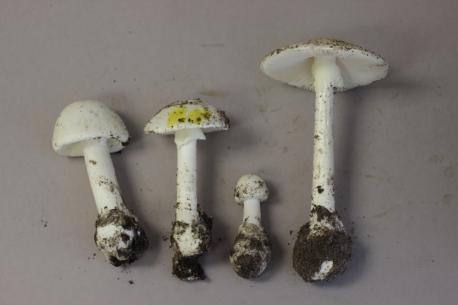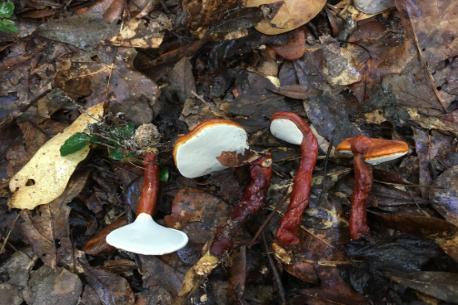Fungal ID Services
-
Mushroom Identification for Potential Human Poisoning Cases
There are many mushroom species in Florida and they can be difficult to identify. Although most mushroom species are harmless or cause only mild gastrointestinal distress, there are a few Florida mushroom species that can be deadly toxic. Therefore, it is critical to identify each mushroom to the species level before you consume it. Unfortunately, there are cases where an unknown mushroom has been eaten and it needs to be identified to determine if that species is toxic. In coordination with Florida Poison Control our lab identifies mushrooms anytime, free of charge when human health is potentially at risk. If you are not sure what mushroom may have been consumed, be sure to keep specimens and take photos to document the fungi for the best chance at identification. For details on documenting fungi for identification see our online guide.

-
Mushroom Identification for Potential Veterinary Poisoning Cases
Dogs and cats sometimes eat things when they are not supposed to and sometimes pets are known to eat fungi. Our lab identifies mushrooms anytime, free of charge when the health of a pet is potentially at risk. We aim to determine what mushroom was eaten and to identify the best course of veterinary care for a pet based on the available evidence. We can consult directly with pet owners or with their veterinarians. If you are not sure what mushroom your pet may have consumed, be sure to keep specimens and take photos to help with identifications. For details on documenting fungi for identification see our online guide.
-
Wood Decay Fungi (on Homes or in Trees)
The most important wood decay organisms on the planet are all fungi. These wood decay fungi can cause serious decay problems in and around your home or in street trees. Failures of wooden structures or street trees can cause serious injury or death if they are not treated in a timely fashion. We offer free consultation for problems related to wood decay fungi in and around Florida homes. We also offer limited identification of wood decay fungi on a case-by-case basis. Depending on the situation we may ask that you coordinate with the extension office in your area. In the cases of wood decay fungi that are identified from trees, we will likely suggest additional on-site consultation with a licensed arborist in your local area.

-
Consultation Regarding Indoor Molds
We do not isolate or identify indoor molds in our laboratory at the University of Florida. Recent state and national guidelines suggest that routine taxonomic identification of molds is not warranted because all indoor mold should be dealt with quickly and effectively, regardless of the species of molds that are present. However, we do offer free consultation services to Florida citizens about problems related to molds or other indoor fungi issues. Our lab also works directly with other employees of the State of Florida with expertise in indoor air quality, including Randy Cantrell (University of Florida program on Housing & Community Development) and Michelle Dale (Florida Indoor Air Program).
Click here to learn how to submit a sample to our mushroom specialist

